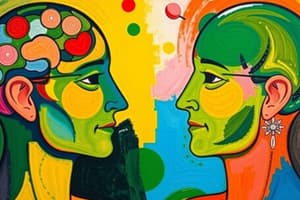Podcast
Questions and Answers
Which of the following scenarios is most likely to lead to counterfactual thinking?
Which of the following scenarios is most likely to lead to counterfactual thinking?
- Winning a lottery.
- Passing an exam with a high score.
- Receiving a gift from a friend.
- Missing a bus by 5 minutes. (correct)
What is the main idea presented about the relationship between free will and immoral actions?
What is the main idea presented about the relationship between free will and immoral actions?
- People who believe in free will are more likely to engage in immoral actions.
- There is no correlation between belief in free will and immoral actions.
- People who believe in free will are less likely to engage in immoral actions. (correct)
- The relationship between belief in free will and immoral actions is complex and requires further research.
What is a potential benefit of counterfactual thinking?
What is a potential benefit of counterfactual thinking?
- It can lead to a more positive outlook on life.
- It can help people to learn from past mistakes. (correct)
- It can help people to predict future events more accurately.
- It can help people to avoid experiencing regret.
What is the "Overconfidence Barrier" as described in the content?
What is the "Overconfidence Barrier" as described in the content?
According to the passage, how does counterfactual thinking affect emotional reactions to events?
According to the passage, how does counterfactual thinking affect emotional reactions to events?
What theory suggests that an individual's past experiences make them more likely to use certain schemas when judging the social world?
What theory suggests that an individual's past experiences make them more likely to use certain schemas when judging the social world?
Why does the accessibility of schemas matter in social judgments?
Why does the accessibility of schemas matter in social judgments?
How does priming impact the development of impressions?
How does priming impact the development of impressions?
Which of these is NOT a factor that contributes to the accessibility of schemas?
Which of these is NOT a factor that contributes to the accessibility of schemas?
Imagine someone is preparing for an important exam. What scenario BEST illustrates the concept of priming in this context?
Imagine someone is preparing for an important exam. What scenario BEST illustrates the concept of priming in this context?
How does the experiment with Donald and word memorization demonstrate the concept of priming?
How does the experiment with Donald and word memorization demonstrate the concept of priming?
Which scenario BEST exemplifies the use of schemas in confusing or ambiguous situations?
Which scenario BEST exemplifies the use of schemas in confusing or ambiguous situations?
Why might someone automatically assume a person on a bus is an alcoholic, even without any evidence?
Why might someone automatically assume a person on a bus is an alcoholic, even without any evidence?
Which of the following scenarios best demonstrates the concept of embodied cognition?
Which of the following scenarios best demonstrates the concept of embodied cognition?
What is the key difference between a self-fulfilling prophecy and an availability heuristic?
What is the key difference between a self-fulfilling prophecy and an availability heuristic?
Which of these statements accurately describes the concept of 'base rate information'?
Which of these statements accurately describes the concept of 'base rate information'?
According to the passage, which group of individuals, based on their thinking style, would be more likely to perform well on a task that requires integrating multiple pieces of information?
According to the passage, which group of individuals, based on their thinking style, would be more likely to perform well on a task that requires integrating multiple pieces of information?
What is the main takeaway from the study involving Canadian teachers and their recommendations for Grade 8 placements?
What is the main takeaway from the study involving Canadian teachers and their recommendations for Grade 8 placements?
Which of the following scenarios is an example of the 'availability heuristic'?
Which of the following scenarios is an example of the 'availability heuristic'?
Which of the following best describes the relationship between 'controlled thinking' and 'beliefs'?
Which of the following best describes the relationship between 'controlled thinking' and 'beliefs'?
The passage mentions that teachers who were told that certain students were 'bloomers' treated them differently in four specific ways. Which of the following is NOT one of those ways?
The passage mentions that teachers who were told that certain students were 'bloomers' treated them differently in four specific ways. Which of the following is NOT one of those ways?
Which of the following is the most accurate definition of a 'self-fulfilling prophecy'?
Which of the following is the most accurate definition of a 'self-fulfilling prophecy'?
The study on the effect of reading articles on the causes of obesity highlights the connection between:
The study on the effect of reading articles on the causes of obesity highlights the connection between:
What is the key difference between a representativeness heuristic and an availability heuristic?
What is the key difference between a representativeness heuristic and an availability heuristic?
Which of the following scenarios best illustrates the 'representativeness heuristic'?
Which of the following scenarios best illustrates the 'representativeness heuristic'?
What is a potential implication of the availability heuristic?
What is a potential implication of the availability heuristic?
The passage discusses the influence of 'thinking styles' on various tasks. Which of the following is NOT a characteristic mentioned as potentially associated with a holistic thinking style?
The passage discusses the influence of 'thinking styles' on various tasks. Which of the following is NOT a characteristic mentioned as potentially associated with a holistic thinking style?
Which of the following is the most accurate description of 'judgemental heuristics'?
Which of the following is the most accurate description of 'judgemental heuristics'?
How does the example of physicians using the availability heuristic when making diagnoses relate to the general concept of availability heuristics?
How does the example of physicians using the availability heuristic when making diagnoses relate to the general concept of availability heuristics?
Flashcards
Social Cognition
Social Cognition
How individuals think about themselves and the social world, focusing on the processing of social information.
Automatic Thinking
Automatic Thinking
Thinking that occurs unconsciously and effortlessly, without deliberate control.
Schemas
Schemas
Mental frameworks that help organize knowledge about the social world, shaping how we perceive and remember information.
Accessibility
Accessibility
Signup and view all the flashcards
Priming
Priming
Signup and view all the flashcards
Effects of Expectation on Ratings
Effects of Expectation on Ratings
Signup and view all the flashcards
Influence of Background on Judgment
Influence of Background on Judgment
Signup and view all the flashcards
Role of Recent Experience in Schemas
Role of Recent Experience in Schemas
Signup and view all the flashcards
Counterfactual Thinking
Counterfactual Thinking
Signup and view all the flashcards
Near-Miss Situations
Near-Miss Situations
Signup and view all the flashcards
Emotional Impact of Counterfactuals
Emotional Impact of Counterfactuals
Signup and view all the flashcards
Overconfidence Barrier
Overconfidence Barrier
Signup and view all the flashcards
Benefits of Counterfactual Thinking
Benefits of Counterfactual Thinking
Signup and view all the flashcards
Self-Fulfilling Prophecy
Self-Fulfilling Prophecy
Signup and view all the flashcards
Bloomers Effect
Bloomers Effect
Signup and view all the flashcards
Embodied Cognition
Embodied Cognition
Signup and view all the flashcards
Judgmental Heuristic
Judgmental Heuristic
Signup and view all the flashcards
Availability Heuristic
Availability Heuristic
Signup and view all the flashcards
Representativeness Heuristic
Representativeness Heuristic
Signup and view all the flashcards
Base Rate Information
Base Rate Information
Signup and view all the flashcards
Analytic Thinking Style
Analytic Thinking Style
Signup and view all the flashcards
Holistic Thinking Style
Holistic Thinking Style
Signup and view all the flashcards
Controlled Thinking
Controlled Thinking
Signup and view all the flashcards
Influence of Beliefs on Actions
Influence of Beliefs on Actions
Signup and view all the flashcards
Cultural Product and Thinking Styles
Cultural Product and Thinking Styles
Signup and view all the flashcards
Trust and Scent
Trust and Scent
Signup and view all the flashcards
Impact of Temperature on Perceptions
Impact of Temperature on Perceptions
Signup and view all the flashcards
Environmental Stability Effect
Environmental Stability Effect
Signup and view all the flashcards
Study Notes
Social Cognition
- Social cognition involves how people think about themselves and the social world, encompassing how they select, interpret, remember, and use social information to form judgments and make decisions.
Automatic Thinking
- Automatic thinking is unconscious, unintentional, involuntary, and effortless.
- Schemas are mental frameworks organizing social knowledge, impacting what we notice, think about, and remember.
- Schemas prove helpful in ambiguous situations.
Accessibility and Priming
- Accessibility refers to schemas' prominence in minds, influencing judgments.
- Accessibility stems from past experiences, current goals, and recent experiences.
- Priming is the process where recent experiences increase schema availability.
- Priming influences impressions, but requires accessible and applicable schemas, like words related to the person's behavior.
Self-Fulfilling Prophecy
- Self-fulfilling prophecies occur when expectations influence actions, subsequently affecting the target person's behavior to match those expectations.
- Teachers' expectations can impact student performance, even without the students knowing.
- Teachers' differential treatment of "bloomers" led to better results for them.
Embodied Cognition
- Embodied cognition connects bodily sensations to mental structures, like schemas.
- Physical sensations can influence judgments, like the affect of a hot vs. iced beverage on perceived friendliness.
Judgmental Heuristics
- Judgmental heuristics are mental shortcuts for quick, efficient judgments.
- Availability heuristic involves judging likelihood by how easily information comes to mind. This shortcut can be inaccurate.
Representativeness Heuristic
- The representativeness heuristic involves judging something by how similar it is to a typical case.
- Base rate information (frequency of categories) is often overlooked and influences judgments.
Thinking Styles
- Analytic thinking focuses on object attributes, common in Western cultures.
- Holistic thinking considers context and relationships, common in East Asian cultures.
Controlled Thinking
- Controlled thinking is conscious, intentional, voluntary, and effortful.
- Beliefs about causation can affect actions and behaviors.
- Counterfactual thinking involves imagining alternative past outcomes, often associated with stronger emotions when close to positive or negative outcomes.
Overconfidence Barrier
- Overconfidence is a common human tendency to overestimate the accuracy of judgments.
Studying That Suits You
Use AI to generate personalized quizzes and flashcards to suit your learning preferences.




